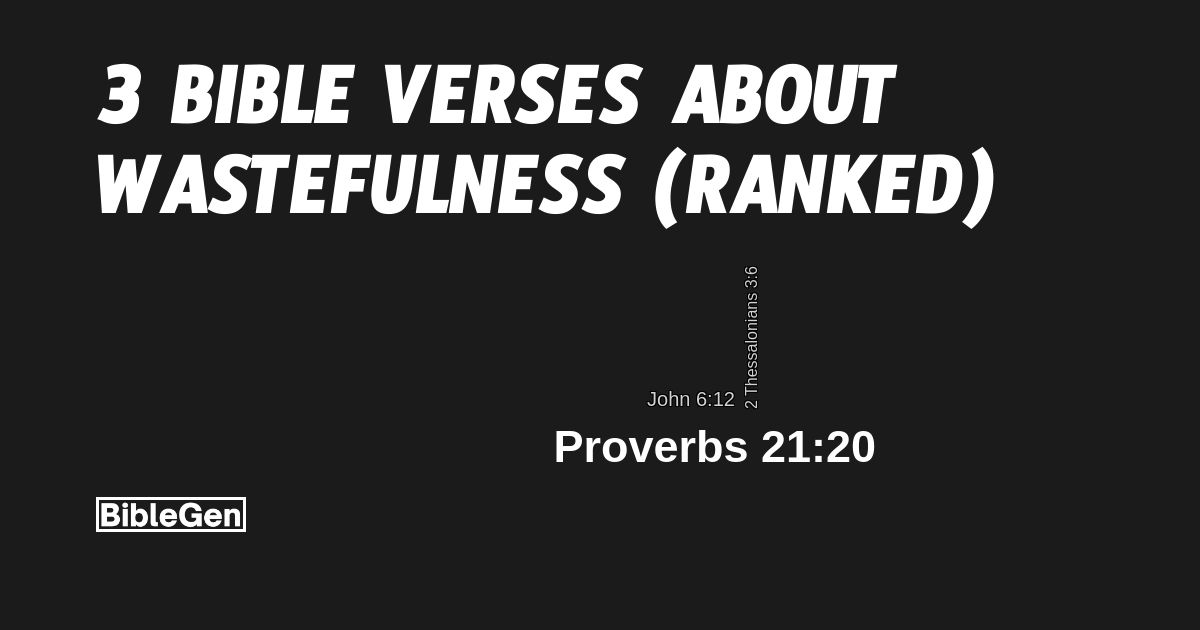Wastefulness is a topic repeatedly addressed within the Bible. Acknowledging how the Bible refers to and advises on wastefulness provides a greater understanding of the value of resources, the importance of stewardship, and the consequences of reckless spending. The process compels us to carefully consider the utilization of our resources and time in a way that aligns with the principles outlined in the Bible.
Why Does the Bible Mention Wastefulness?
The Bible mentions wastefulness as a caution against improper usage of resources and gifts provided by God. It underscores a central Christian teaching around the concept of stewardship – that everything we possess is lent to us by God and we are called to use it wisely. The topic of wastefulness in the Bible prompts followers to acknowledge the value of these gifts and utilize them responsibly, without extravagance or misuse.
What Are the Lessons from the Bible Regarding Wastefulness?
The Bible offers several lessons regarding wastefulness. Primarily, it conveys that every resource should be used judiciously and gratefully. This extends beyond physical or financial resources to encompass time, talents, and opportunities. The Bible endorses diligent, mindful use of resources and eschews any extravagant or frivolous waste. Moreover, it instills a sense of accountability, arguing that we are accountable to God for how we use what has been given to us.
Who Benefits from Understanding the Bible’s Teachings on Wastefulness?
Individuals who understand the Bible’s teachings on wastefulness stand to benefit greatly. Comprehending the Bible’s concept of wastefulness prompts one to recognize the value of their resources, inspiring gratefulness and thoughtful utilization. By encouraging thrift and responsible use, the Bible assists individuals in becoming better stewards of their resources, which can lead to improved financial stability, a sense of fulfillment, and a deeper spiritual connection.
How Does the Bible Instruct on Avoiding Wastefulness?
The Bible promotes the avoidance of wastefulness through several key instructions. Firstly, it encourages the minimal use of resources, urging followers to live within their means and avoid extravagances. Secondly, the Bible instructs followers to value each resource, be it time, talent, or physical items, suggesting that each should be used to its fullest potential. Finally, the Bible underscores the importance of sharing resources with others, particularly with the less fortunate, as a form of grace and charity rather than wasting them.
When Should the Teachings on Wastefulness in the Bible be Applied?
The teachings on wastefulness in the Bible should be applied continually in our daily lives. Every decision regarding the use of resources should be made in consideration of these principles. This extends beyond just financial and physical resources to include our time, energy, talents, and opportunities. The Bible’s teachings should guide decisions, motivate responsible action, and inspire a lifestyle of thoughtful stewardship, generosity, and gratitude. Applying these teachings consistently can imbue our lives with a sense of purpose, fulfillment, and deep rooted joy.
Below is our full list of bible verses on wastefulness (King James Version – KJV) provided in ranked order.
Most Popular Bible Verses About Wastefulness
Proverbs 21:20
“20 There is treasure to be desired and oil in the dwelling of the wise; but a foolish man spendeth it up.”
Related Themes: Money Finances Business Wisdom Stewardship
John 6:12-13
“12 When they were filled, he said unto his disciples, Gather up the fragments that remain, that nothing be lost.13 Therefore they gathered them together, and filled twelve baskets with the fragments of the five barley loaves, which remained over and above unto them that had eaten.”
Related Themes: Recycling
2 Thessalonians 3:6-15
“6 Now we command you, brethren, in the name of our Lord Jesus Christ, that ye withdraw yourselves from every brother that walketh disorderly, and not after the tradition which he received of us.7 For yourselves know how ye ought to follow us: for we behaved not ourselves disorderly among you;8 Neither did we eat any man’s bread for nought; but wrought with labour and travail night and day, that we might not be chargeable to any of you:9 Not because we have not power, but to make ourselves an ensample unto you to follow us.10 For even when we were with you, this we commanded you, that if any would not work, neither should he eat.11 For we hear that there are some which walk among you disorderly, working not at all, but are busybodies.12 Now them that are such we command and exhort by our Lord Jesus Christ, that with quietness they work, and eat their own bread.13 But ye, brethren, be not weary in well doing.14 And if any man obey not our word by this epistle, note that man, and have no company with him, that he may be ashamed.15 Yet count him not as an enemy, but admonish him as a brother.”
Related Themes: Idleness Excommunication Traditions

